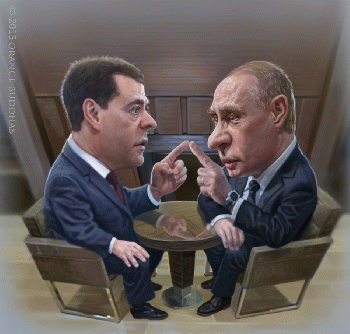So a congregation of NATO's top brass ensconced in their echo chambers target the Russian Central Bank with sanctions and expect what? Cookies?
What they got instead was Russia's deterrence forces bumped up to "a special regime of duty" - which means the Northern and Pacific fleets, the Long-Range Aviation Command, strategic bombers, and the entire Russian nuclear apparatus on maximum alert.
One Pentagon general very quickly did the basic math on that, and mere minutes later, a Ukrainian delegation was dispatched to conduct negotiations with Russia in an undisclosed location in Gomel, Belarus.
Meanwhile, in the vassal realms, the German government was busy "setting limits to warmongers like Putin" - quite a rich undertaking considering that Berlin never set any such limits for western warmongers who bombed Yugoslavia, invaded Iraq, or destroyed Libya, in complete violation of international law.
While openly proclaiming their desire to "stop the development of Russian industry," damage its economy, and "ruin Russia" - echoing American edicts on Iraq, Iran, Syria, Libya, Cuba, Venezuela and others in the Global South - the Germans could not possibly recognize a new categorical imperative.
They were finally liberated from their WWII culpability complex by none other than Russian President Vladimir Putin. Germany is finally free to support and weaponize neo-Nazis out in the open all over again - now of the Ukrainian Azov battalion variety.
To get the hang of how these NATO sanctions will "ruin Russia," I asked for the succinct analysis of one of the most competent economic minds on the planet, Michael Hudson, author, among others, of a revised edition of the must-read Super-Imperialism: The Economic Strategy of American Empire.
Hudson remarked how he is "simply numbed over the near-atomic escalation of the US." On the confiscation of Russian foreign reserves and cut-off from SWIFT, the main point is "it will take some time for Russia to put in a new system with China. The result will end dollarization for good, as countries threatened with 'democracy' or displaying diplomatic independence will be afraid to use US banks."
This, Hudson says, leads us to "the great question - whether Europe and the Dollar Bloc can buy Russian raw materials - cobalt, palladium, etc, and whether China will join Russia in a minerals boycott."
Hudson is adamant that "Russia's Central Bank, of course, has foreign bank assets in order to intervene in exchange markets to defend its currency from fluctuations. The ruble has plunged. There will be new exchange rates. Yet it's up to Russia to decide whether to sell its wheat to West Asia, that needs it; or to stop selling gas to Europe via Ukraine, now that the US can grab it."
About the possible introduction of a new Russia-China payment system - bypassing SWIFT and combining the Russian SPFS (System for Transfer of Financial Messages) with the Chinese CIPS (Cross-Border Interbank Payment System) - Hudson has no doubts, "the Russian-China system will be implemented. The Global South will seek to join and at the same time keep SWIFT - moving their reserves into the new system."
I'm going to de-dollarize myself
So the US itself, in another massive strategic blunder, will speed up de-dollarization. As the managing director of Bocom International Hong Hao told the Global Times, with energy trade between Europe and Russia de-dollarized, "that will be the beginning of the disintegration of dollar hegemony."
It's a refrain the US administration was quietly hearing last week from some of its own largest multinational banks, including notables like JPMorgan and Citigroup.
(Note: You can view every article as one long page if you sign up as an Advocate Member, or higher).






